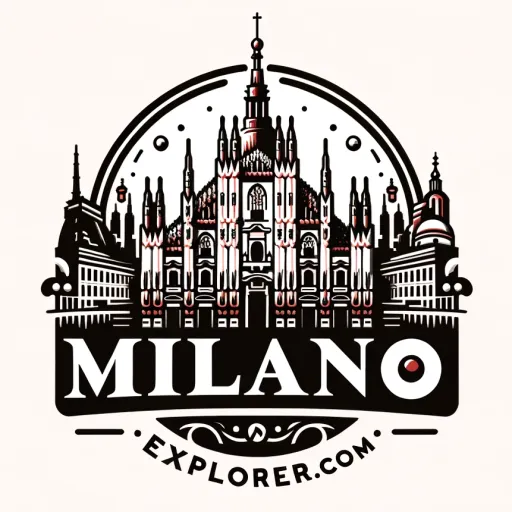Milan, a city steeped in culture and history, has transformed into a dynamic hub for business and commerce, luring professionals worldwide. Foreigners traveling to Milan for business purposes will find themselves immersed in a city that balances its rich past with a forward-thinking attitude. The city’s reputation as a leader in fashion and design is matched by its status as an economic powerhouse in Italy and Europe. As such, business travelers can expect to engage with leading-edge industries, from finance to technology, all within a setting that’s deeply influenced by the Italian way of life.
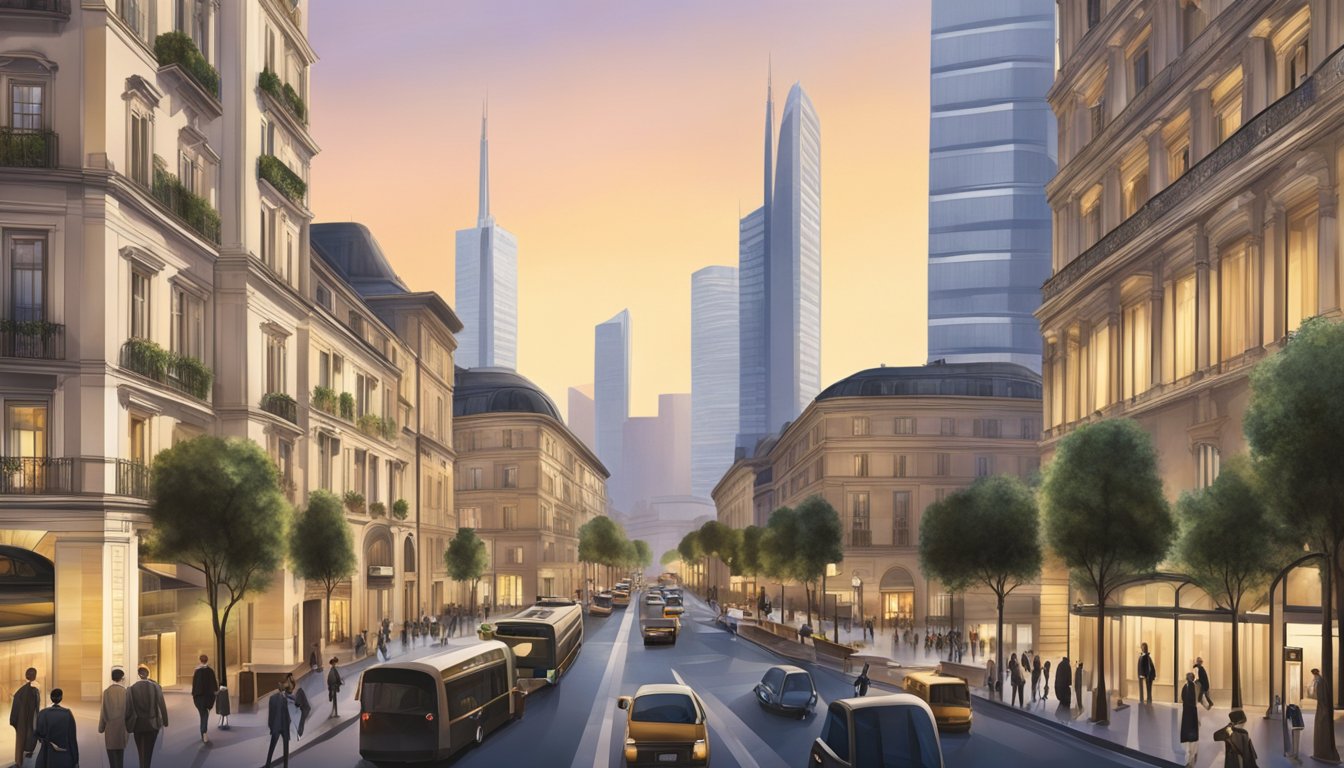
For corporate travelers, finding suitable accommodations in Milan is of paramount importance. The city hosts an array of business hotels that cater to a spectrum of needs, from luxury suites to practical conference facilities. Moreover, Milan’s culinary scene offers a delightful spectrum of dining experiences that are essential to conducting business in Italy, where meals form a cornerstone of relationship-building. Navigating the city is facilitated by an efficient transportation network, ensuring smooth mobility for time-pressed executives.
Milan business travel tips
Key Takeaways
- Milan combines a rich cultural tapestry with a modern business landscape, providing a unique setting for corporate travel.
- Selecting the right accommodation is crucial, with a variety of options available to suit different business needs.
- Efficient transport systems and dining experiences tailored for professional meetings enhance the Milanese corporate travel experience.
History of Milan
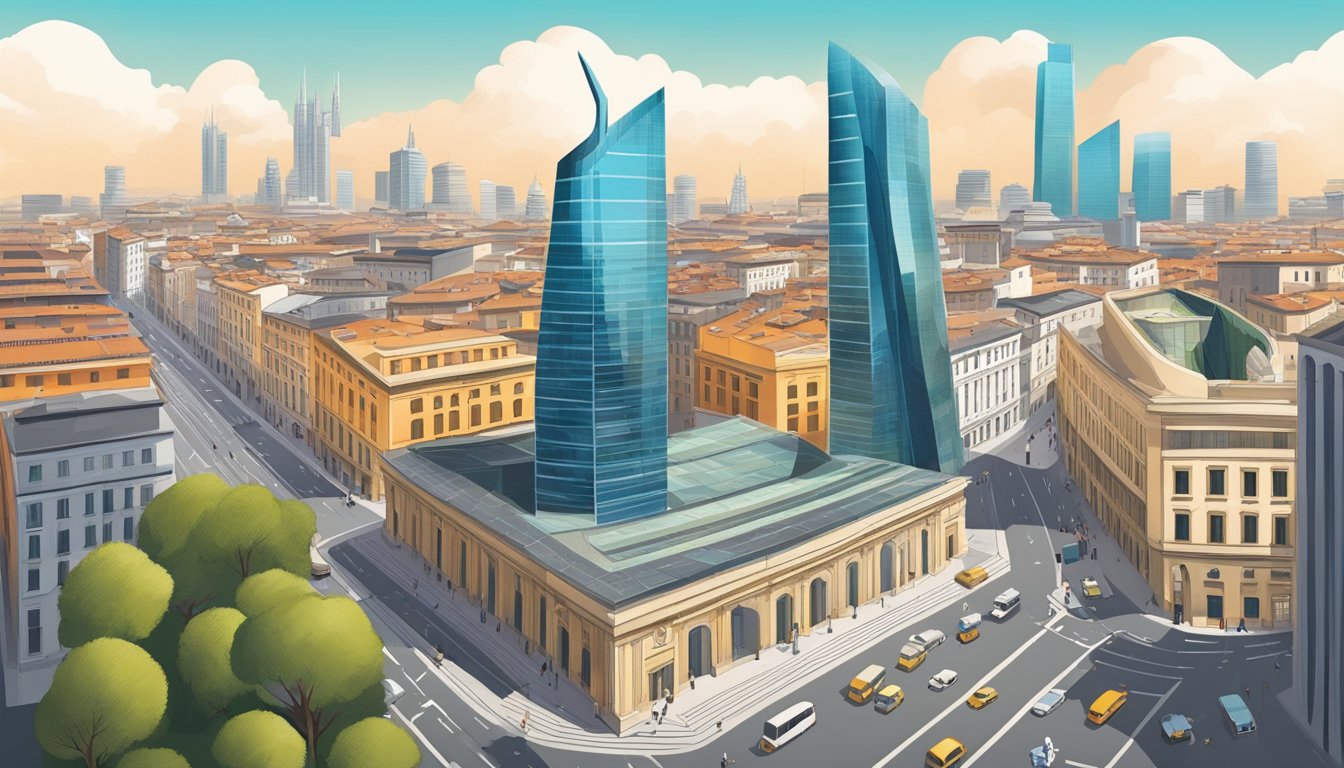
This section explores Milan’s storied past, from its Ancient Origins to its influential role during the Italian Renaissance and Beyond.
Ancient Origins
Known as Mediolanum under Roman rule, Milan’s history is deeply rooted in ancient times with settlements dating back to around 600 BCE. The city was a politically significant locus, becoming the capital of the Western Roman Empire. During this period, it expanded rapidly, developing its infrastructure and public buildings, parts of which can still be glimpsed today.
Italian Renaissance and Beyond
The Italian Renaissance marked a pivotal period in Milan’s history with prominent figures such as Leonardo da Vinci contributing to its cultural legacy. Under the auspices of the influential Sforza family, the city became a center of art and learning. The iconic Sforza Castle was constructed during this time and became a symbol of Milan’s prestige. The Duomo di Milano, or Cathedral of Milan, also embodies the city’s rich heritage and architectural grandeur, leaving a lasting impression on all who visit.
Cultural Significance
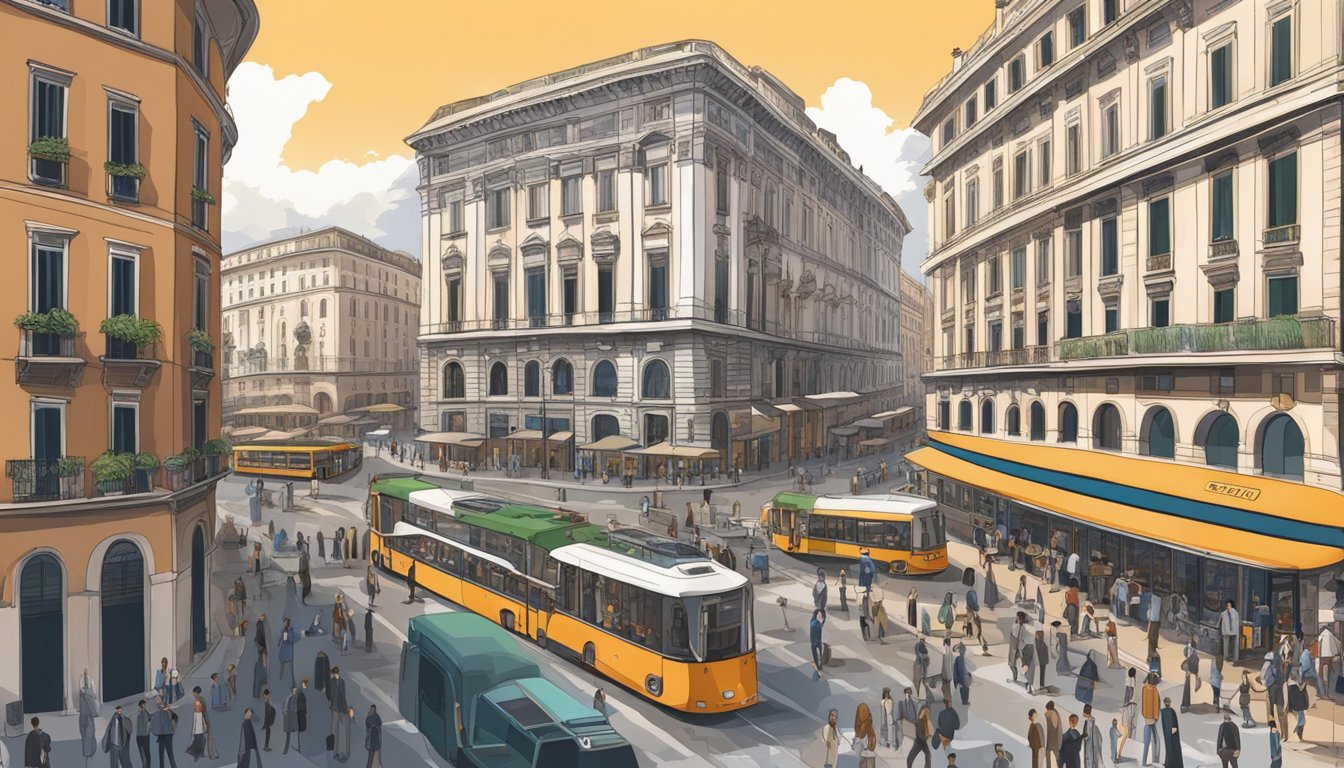
Milan’s role as a global business hub is mirrored by its profound cultural significance, adding depth to any corporate traveler’s experience. The city’s extensive artistic heritage and its pivotal role in the music and opera scene offer a fascinating backdrop to the bustling streets and modern skyline.
Artistic Landmarks
The cultural tapestry of Milan is sewn with the threads of the Italian Renaissance and modern artistic movements. Among its many artistic landmarks, the Duomo di Milano stands as an architectural marvel, boasting centuries of history and ornate Gothic façades. Equally important for art enthusiasts, The Last Supper, Leonardo da Vinci’s renowned mural, exemplifies Milan’s rich artistic heritage, and its viewing at the Convent of Santa Maria delle Grazie is a rite of passage for visitors.
Just as the Duomo is inextricably linked to the city’s identity, the Pinacoteca di Brera reflects the historic artistry of the region. This prestigious gallery houses an impressive collection of Italian and European masterpieces, showcasing works that span from the Middle Ages to the contemporary era. The Brera District itself has a vibrant art scene, characterized by elegant galleries and charming ateliers.
Influence of Music and Opera
Milan’s cultural domain extends into the auditory realm where the influence of music and opera floors both its residents and visitors. The epicenter of this melodic influence is undoubtedly Teatro alla Scala, commonly referred to as La Scala. Considered one of the most prestigious opera houses in the world, La Scala has been the stage for some of the most decorated operatic performances and esteemed musical talents.
Beyond the grandeur of La Scala, Milan’s contribution to music encompasses a diverse spectrum spanning from classical to contemporary genres. Sforza Castle’s museums often explore the convergence of visual and musical arts, particularly emphasizing the city’s engagement with the harmony of these disciplines. Milan’s tradition of musical innovativeness continues to thrive, reinforcing its status as an essential nexus for cultural connoisseurs.
Fashion and Design
Milan is not only recognized for its economic prowess but also as a global beacon for the fashion and design industries. Business travelers with an interest in these fields will find a plethora of opportunities to explore during their stay.
Milan as the Fashion Capital
Milan is heralded as a fashion capital alongside Paris, London, and New York. Home to the renowned Fashion Week, Milan’s fashion events are a pivotal time for industry professionals, showcasing a preview of upcoming trends and collections. The city is also the cradle of iconic fashion houses and up-and-coming designers. The prestigious Quadrilatero della Moda, or ‘Fashion District’, is Milan’s luxurious shopping area, housing flagship stores and boutiques of international renown.
Design and Innovation
Design in Milan forms an integral part of the city’s identity. During Design Week, Milan transforms into a showcase of innovation and creativity, inviting designers from all over the world to exhibit their works. Not limited to a single event, design in Milan is a year-round affair. The city’s connection to various forms of design is evident in locations like the Galleria Vittorio Emanuele II, an architectural masterpiece and one of the world’s oldest shopping malls. Milan’s design scene extends beyond fashion into furniture, lighting, and modern art, making the city a comprehensive design capital.
Business and Economy
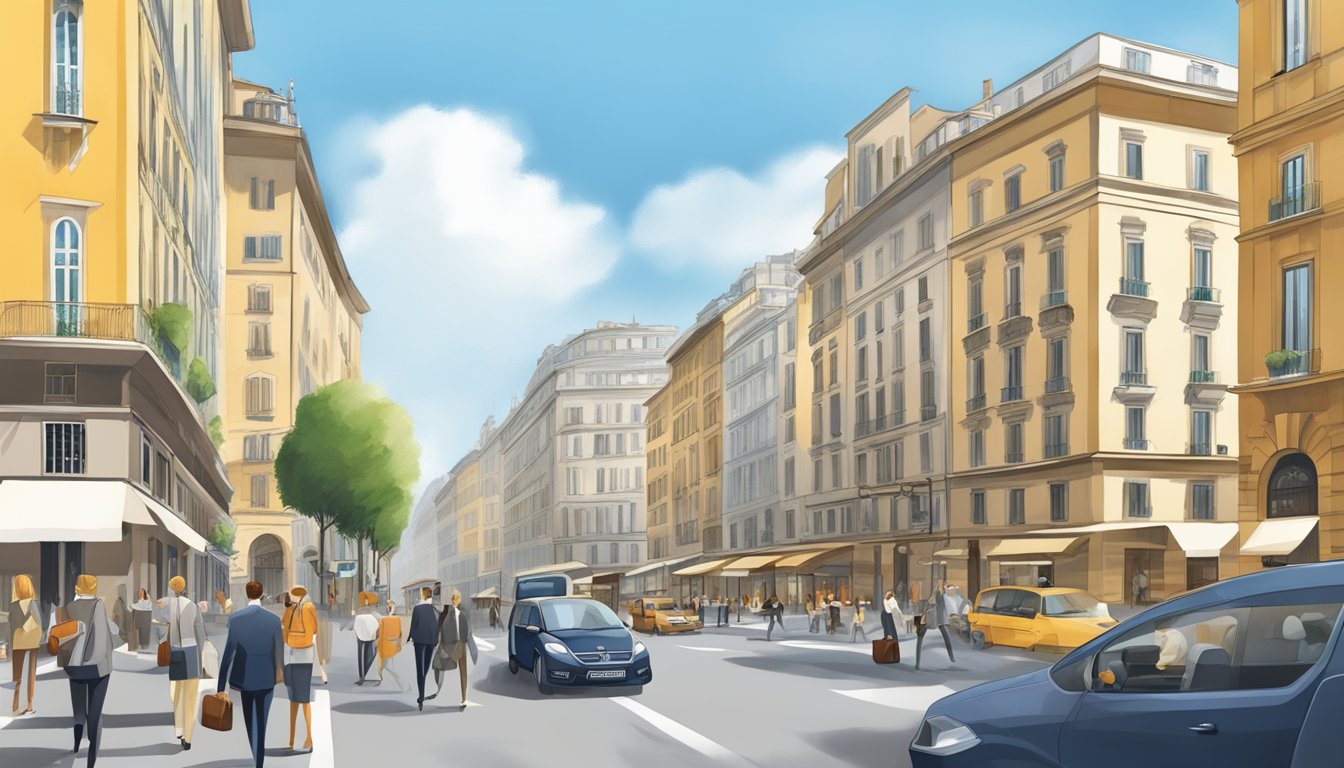
Milan, internationally recognized as a pivotal economic and industrial powerhouse, serves as a cornerstone for business travelers seeking opportunities within its active markets and corporate spaces.
Economic Hub
The city of Milan stands at the forefront of Italy’s economy, recognized as one of the primary financial centers of the country. It houses the Italian Stock Exchange, which is a critical entity catering to the business sector, supporting both national and international transactions. Business travelers often schedule meetings in proximity to this financial hub to facilitate easy access to corporate services and collaboration opportunities.
Industry and Commerce
Regarding industry and commerce, Milan is a dynamic force with a diverse economic fabric. The city is not only the host of fashion and design giants but also home to various multinational corporations. Business centers and meeting rooms abound, reflecting the necessity for configurable spaces equipped for global commerce. The corporate ventures often extend out of town to the city’s outskirts, where industrial parks and expo centers cater to larger-scale business operations. Business trips to Milan typically include a mix of central city engagements and explorative outings to these commercial zones, underlining the city’s reputation as a business hub critical for business travelers navigating the European and global marketplaces.
Cuisine and Dining
When traveling to Milan for business, one can look forward to experiencing an exquisite blend of traditional and innovative Italian cuisine. The dining experience is an integral part of the cultural immersion, and Milan offers a variety of flavors ranging from classic Milanese dishes to contemporary fusions.
Traditional Dishes
One cannot speak of Milanese culinary tradition without mentioning the iconic Risotto alla Milanese, a creamy, saffron-infused dish that is the epitome of comfort food in this region. Another staple is the sumptuous Cotoletta alla Milanese, which is a perfectly breaded and fried veal cutlet. For cheese lovers, the region’s Gorgonzola, with its strong and distinctive flavor, is an absolute must-try. These traditional dishes form the backbone of Milan’s gastronomic heritage.
Culinary Experience
Milan’s dining scene offers more than just traditional foods; it’s a place where one can discover the Italian concept of aperitivo—a pre-dinner social experience featuring a selection of light bites and drinks. For those looking to indulge in the morning ritual of the Milanese, a well-crafted cappuccino or a simple, yet reinvigorating latte at a local café is essential. These experiences are pillars of the city’s culinary identity, offering a blend of flavors that cater to both traditional and modern palates.
Urban Exploration
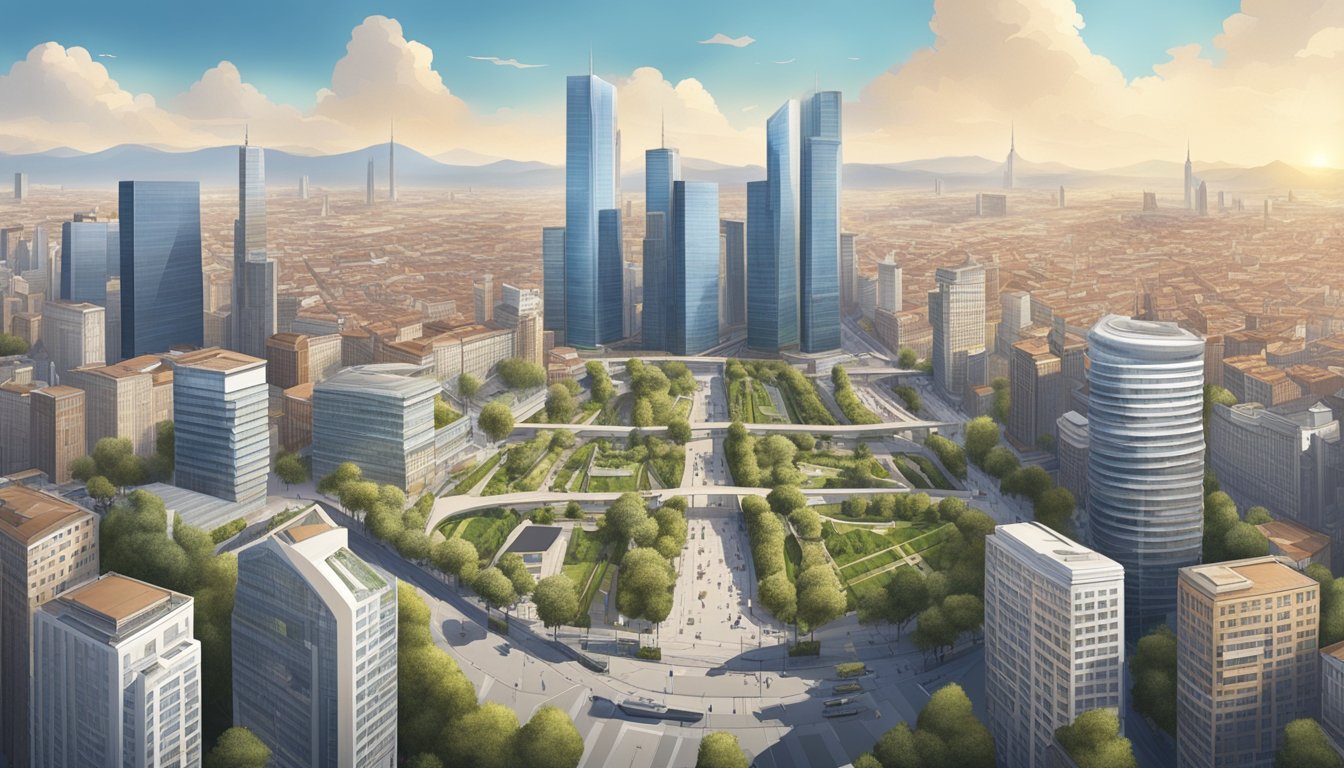
Milan serves as a canvas that beautifully entwines its rich historical architecture with sprawling green spaces. Foreigners on corporate travel can easily immerse themselves in the city’s culture through a leisurely exploration of its iconic landmarks and serene parks.
Landmarks and Architecture
Milan’s architectural heritage is anchored by the Duomo, a symbol of Gothic prowess and a testament to grandiose design. Business travelers should not miss the chance to visit this Milan Cathedral, an epitome of crafted marbles adorning the city’s skyline. A stroll through the bustling Piazza reveals Milan’s vibrant communal life and leads to the imposing Sforzesco Castle. Lined along Corso Magenta are hidden architectural jewels, and a guided walking tour offers invaluable insights into Milan’s storied past.
Parks and Recreation
For relaxation amid a busy schedule, Parco Sempione offers an oasis of calm. Business travelers can unwind on the lawns or meander along picturesque paths. This extensive green space lies in the heart of the city and provides a breath of fresh air as well as recreational activities. Adjacent to it is the historical Sforzesco Castle, framing a perfect backdrop for post-conference leisure. Moreover, Milan’s intricate network of canals presents an opportunity for serene walks away from the urban hustle, proposing a contrast to the metropolitan rush.
Accommodation
When visiting Milan for business, one has the luxury of choosing from a plethora of accommodations that cater to various needs, ranging from high-end luxury to stylish boutique hotels indicative of the city’s fashion legacy. The focus here is on providing travelers with a comfortable stay in spaces that understand the nuances of corporate requirements.
Luxury and Comfort
For those seeking luxury and comfort, the Sheraton Diana Majestic offers an upscale experience. It boasts amenities tailored for the business class, including high-speed internet and meeting rooms. The hotel’s location in the heart of Milan makes it a convenient option for travelers looking to stay close to the city’s commercial hubs.
Staying in Style
For travelers who appreciate the fusion of luxury and local culture, The Yard Milan is a standout choice. It marries opulence with a unique, sports-themed decor that captures the essence of Milanese sophistication. Each suite in this boutique hotel is distinct, making every stay a new and stylish experience reflective of Milan’s fashionable spirit.
Transport and Mobility
Milan’s transport network is robust, catering to the dynamic needs of business travelers. Efficient public transport options and strategic international connections ensure convenience and time-saving travel.
Navigating the City
Milan’s public transportation system is a comprehensive network that includes trams, buses, and metro lines, facilitating travel within the city. For those staying in the business district, Porta Nuova area offers excellent public transport links to other parts of Milan. Tickets for public transport can be used interchangeably between trams, buses, and metro within a set time, providing flexibility in planning one’s commute. The city also provides a bike-sharing service for more sustainable and quick trips.
The Milano Centrale train station is one of the main hubs for high-speed trains, connecting Milan to other Italian cities and European capitals. Business travelers often take advantage of this service for intercity meetings.
International Connections
Milan serves as a prominent gateway to international destinations through its three airports: Linate, Malpensa, and Bergamo. Linate Airport is the closest to the city center, mostly managing domestic flights and some European routes. It’s an ideal choice for travelers looking for quick access to the heart of Milan. Moreover, the Malpensa Express connects Malpensa Airport—the largest in Milan—to Milano Centrale station in about 50 minutes, also making stops at the Cadorna and Porta Garibaldi stations. For low-cost airlines and flights primarily within Europe, Bergamo Airport is commonly used. It is situated a bit further away from the city but is accessible by bus and shuttle services.
Events and Festivities
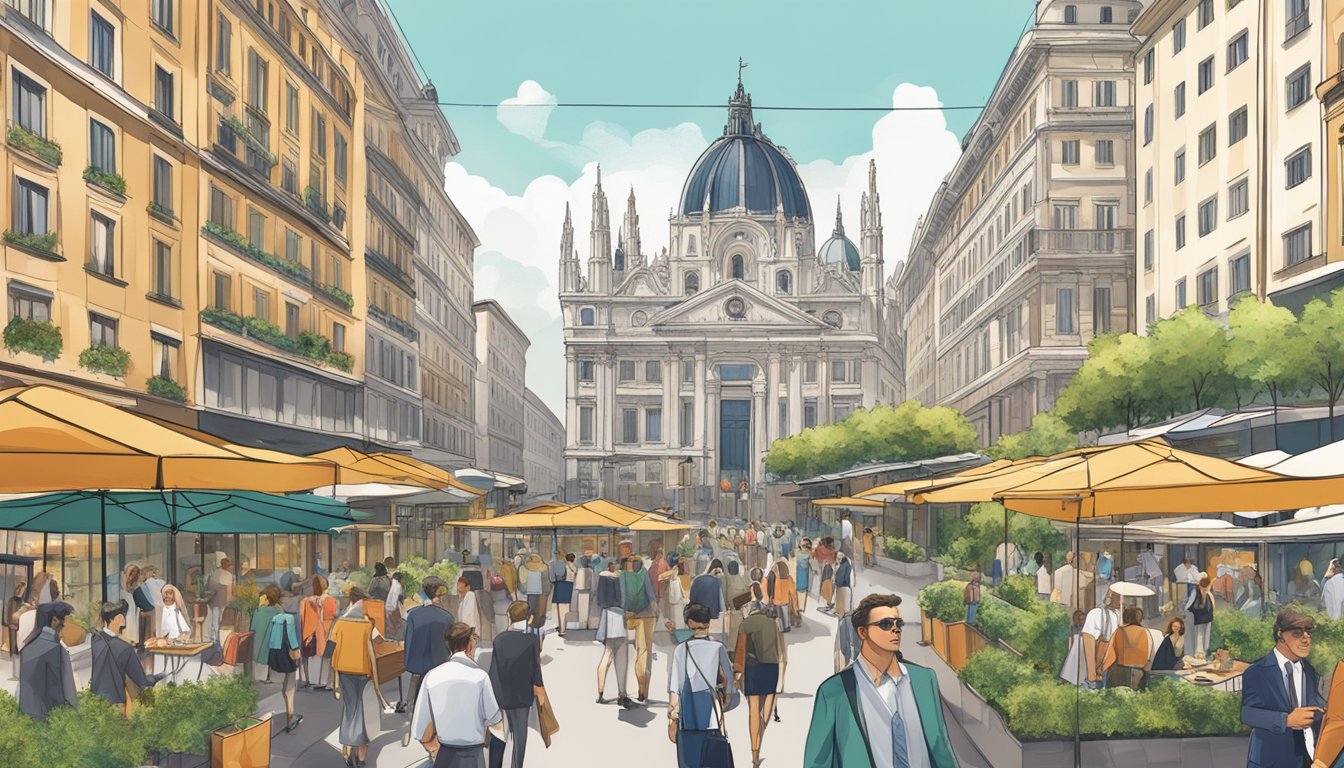
Milan, a bustling metropolis, is not just Italy’s business and fashion capital but also a city rich with vibrant events and local festivities. Travelers can indulge in an array of cultural and corporate happenings that make their visit both exciting and productive.
Key Events
Milan Fashion Week stands as a hallmark event, bringing together the world’s fashion elite and offering a glimpse into the latest trends and designs. This illustrious event typically sees professionals networking in the high-end milieu of fashion shows and after-parties. Visitors attending for business can find gaps in their schedules to experience the splendor of Italian fashion.
Besides fashion, Milan hosts major business conferences, exhibitions, and industry-specific forums. Among them, events focusing on design and innovation are paramount; the Salone del Mobile and Milano Design Week attract thousands of professionals keen on exploring cutting-edge trends and forming strategic partnerships.
Local Festivities
The nightlife in Milan offers a blend of leisure and informal networking opportunities. Travelers can enjoy Milanese events in areas like the Navigli district, where the ambiance of the city’s canals provide a picturesque setting for evening social connections.
When not engaged in business activities, visitors can immerse themselves in Milanese culture by partaking in local festivities such as Festa di San Giovanni or Carnevale Ambrosiano. These events showcase the city’s rich heritage with traditional processions, music, and food, offering a taste of the local life beyond the boardroom.
Conclusion
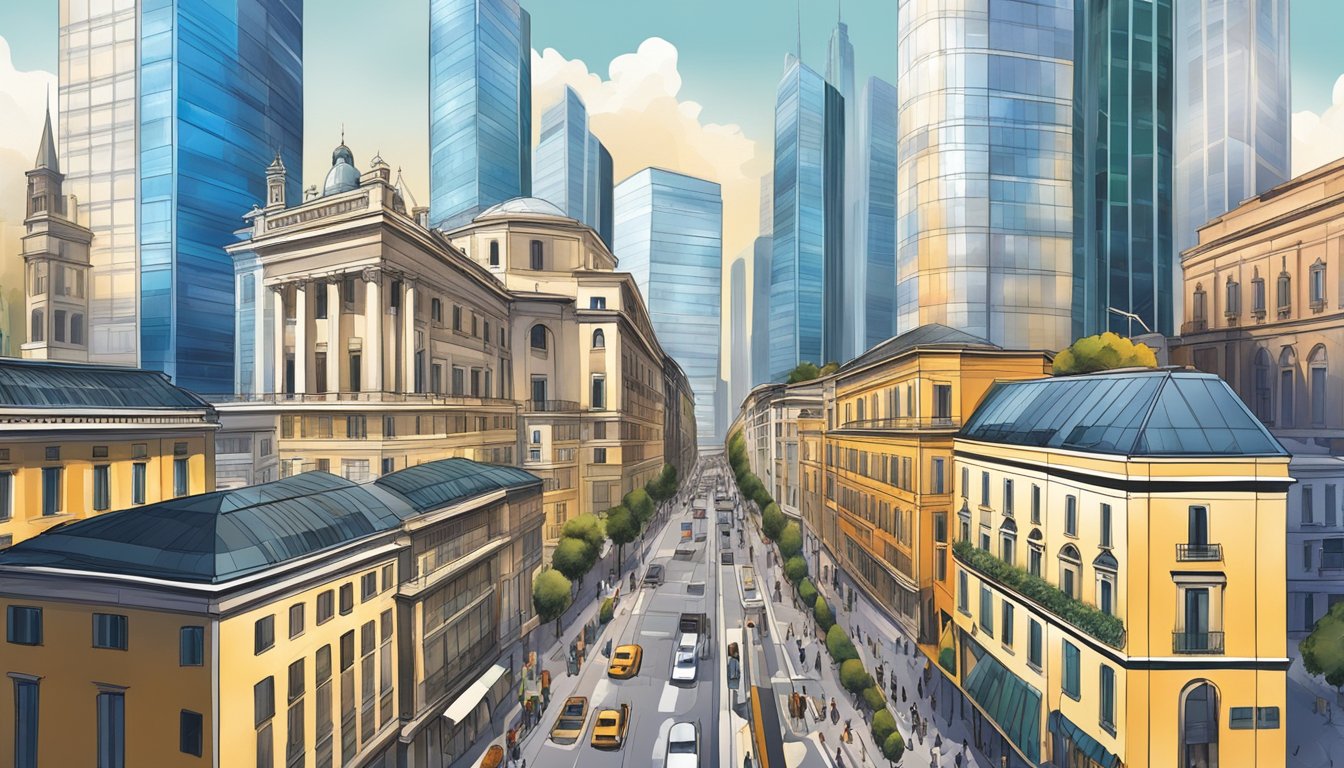
Milan’s status as a bustling business hub and fashion capital requires that corporate travelers find accommodations that balance comfort, convenience, and efficiency.
Summary
Corporate stays in Milan offer a range of amenities tailored to business needs, whether one is preparing for meetings or unwinding after a day’s work. Hotels like the Uptown Palace combine high-tech business centers with well-appointed rooms, ensuring productivity is never hampered by lack of resources. Additionally, the convenience of transport options for arriving in and navigating through Milan is key, and business visitors must be aware of the ease of air travel when planning their trip.
Final Thoughts
When they visit Milan, business professionals can also savor the cultural experiences the city offers. The Duomo di Milano, with its impressive architecture, is a noteworthy attraction that can provide a tranquil respite from the bustle of business activities. Choosing the right accommodations, such as the Best Western Hotel Berlino, close to trade fairs and Milan’s center, enhances one’s stay, striking a perfect balance between work commitments and cultural exploration.
Frequently Asked Questions
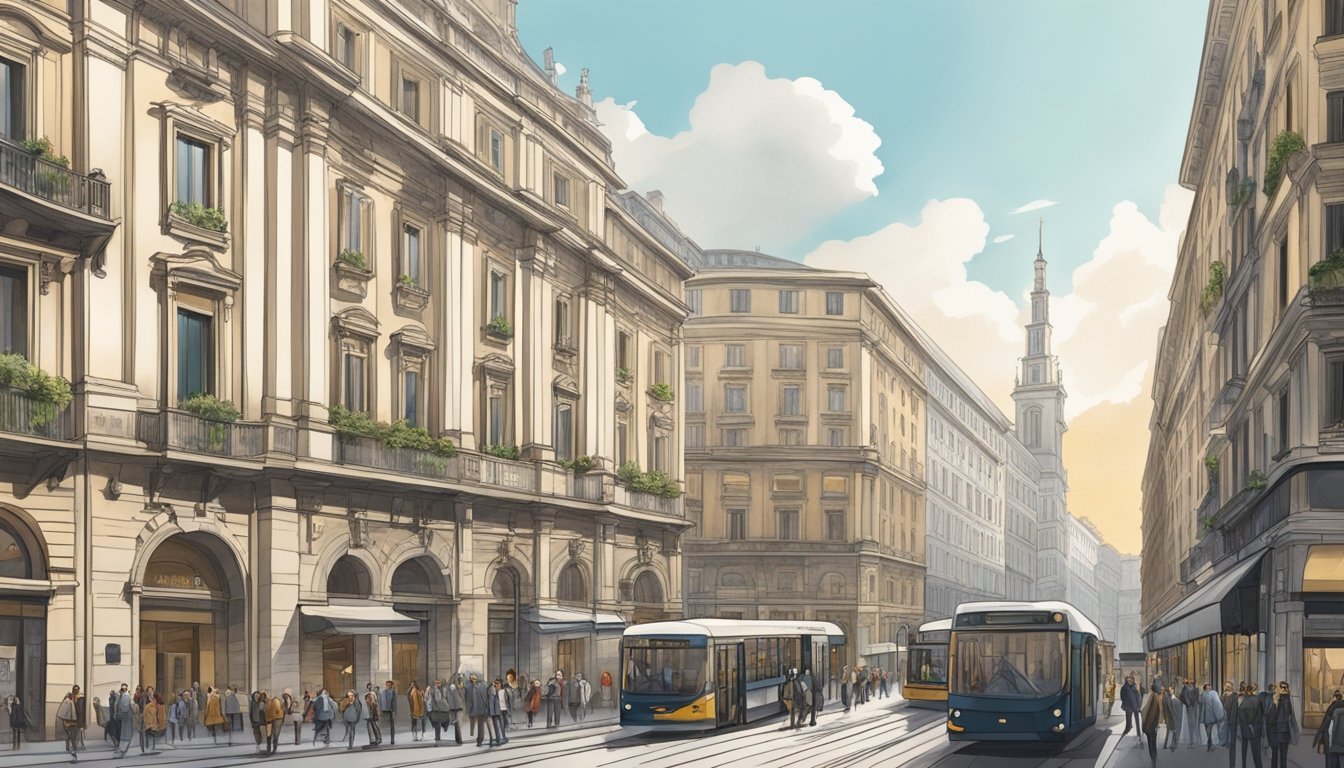
Navigating the nuances of corporate travel in Milan can ensure a smooth and successful business trip. From understanding local customs to choosing the right accommodations, these insights can help travelers prepare for their journey.
What are the customary tipping practices for services in Milan?
In Milan, tipping is customary but not mandatory. For services like taxis and restaurants, rounding up to the nearest euro is common. In higher-end establishments, a tip of 5-10% is appreciated if the service is exceptional.
What should travelers be aware of before their first business trip to Milan?
Travelers should be aware of cultural norms such as the Italian practice of aperitivo, a pre-dinner drink and snack time, ideal for informal business conversations. One should also take note of local holidays and the siesta time when many businesses close in the afternoon.
What are the best modes of transportation for navigating Milan during a corporate visit?
Milan’s public transportation system is efficient, with a network of subways, trams, and buses covering the city. For time-saving and convenience, corporate travelers may prefer taxis or car services, especially when traveling to meetings in less accessible areas.
What are some recommended corporate-friendly accommodations in Milan?
The city offers numerous corporate-friendly hotels with amenities such as meeting rooms, business centers, and convenient locations. For upscale choices, the Milan city center and surrounding business districts have establishments well-suited for business travelers.
How can foreign visitors efficiently schedule meetings and networking events across Milan?
Foreign visitors should consider traffic patterns and distances between venues. Utilizing scheduling apps can assist with time management. Moreover, aligning meetings within close proximity or in business-focused areas like Porta Nuova can maximize efficiency.
What leisure activities can business travelers engage in during their stay in Milan?
Milan is not just about work; there are ample opportunities for leisure, such as exploring the iconic Duomo di Milano or enjoying a performance at La Scala Opera House. Those interested in art and history might spend a few relaxing hours at the Pinacoteca di Brera.
